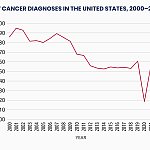
Are you getting enough sleep? How good is your sleep quality? Increasing evidence from scientific research has linked “poor sleep” to accelerated brain aging and suggests that addressing sleep problems early in life may help preserve our cognitive functions.
Previous research found that
In this article, we highlight key findings from two recent studies published in 2024 that offer insights into the link between sleep and brain health and how to better protect our cognitive functions.
According to a new study published in Neurology, the medical journal of the American Academy of Neurology, people who experience issues with sleep quality in their early middle age, such as having trouble falling or staying asleep, show more signs of cognitive health problems in late middle age.
While the study shows a correlation between sleep quality and signs of brain aging, the findings do not prove that sleep issues accelerate brain aging.
According to a previous study published in January in Neurology, people who experience disrupted sleep in their 30s and 40s are more likely to have memory and cognitive problems later in life.
“Even in early adulthood, sleep quality results in measurable changes in cognitive performance by mid-life. The study findings support the importance of sleep quality, uninterrupted, or unfragmented sleep in relation to cognitive performance,” said David Merrill, MD, PhD, a geriatric psychiatrist and director of the Pacific Neuroscience Institute’s Pacific Brain Health Center in California who was not involved in the study.
“Things like lowering stress levels as we head towards bedtime, taking a warm shower or bath, sleeping in a colder room at a lower temperature — all these have been tied to possibly improving the quality of sleep during the night. We also know about things like avoiding
“It is important to prioritize sleep health,” said Scott Kaiser, MD, a geriatrician and the director of geriatric health for the Pacific Neuroscience Institute in Santa Monica, California. “Sleep hygiene – preparing your environment, going to and getting up at the same time – is all very important.”
“It is amazing how many of us have poor sleep hygiene. Although there are certainly other lifestyle factors that contribute to dementia, sleep is one we can focus on by being consistent,” Kaiser said.





